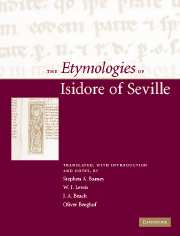Book contents
- Frontmatter
- Contents
- Acknowledgements
- Note to the Reader
- INTRODUCTION
- THE ETYMOLOGIES
- Analytical table of contents
- Book I Grammar (De grammatica)
- Book II Rhetoric and dialectic (De rhetorica et dialectica)
- Book III Mathematics (De mathematica)
- Book IV Medicine (De medicina)
- Book V Laws and times (De legibus et temporibus)
- Book VI Books and ecclesiastical offices (De libris et officiis ecclesiasticis)
- Book VII God, angels, and saints (De deo, angelis et sanctis)
- Book VIII The church and sects (De ecclesia et sectis)
- Book IX Languages, nations, reigns, the military, citizens, family relationships (De linguis, gentibus, regnis, militia, civibus, affinitatibus)
- Book X Vocabulary (De vocabulis)
- Book XI The human being and portents (De homine et portentis)
- Book XII Animals (De animalibus)
- Book XIII The cosmos and its parts (De mundo et partibus)
- Book XIV The earth and its parts (De terra et partibus)
- Book XV Buildings and fields (De aedificiis et agris)
- Book XVI Stones and metals (De lapidibus et metallis)
- Book XVII Rural matters (De rebus rusticis)
- Book XVIII War and games (De bello et ludis)
- Book XIX Ships, buildings, and clothing (De navibus aedificiis et vestibus)
- Book XX (Provisions and various implements)
- APPENDIX Correspondence of Isidore and Braulio
- INDEX
Book II - Rhetoric and dialectic (De rhetorica et dialectica)
Published online by Cambridge University Press: 22 September 2009
- Frontmatter
- Contents
- Acknowledgements
- Note to the Reader
- INTRODUCTION
- THE ETYMOLOGIES
- Analytical table of contents
- Book I Grammar (De grammatica)
- Book II Rhetoric and dialectic (De rhetorica et dialectica)
- Book III Mathematics (De mathematica)
- Book IV Medicine (De medicina)
- Book V Laws and times (De legibus et temporibus)
- Book VI Books and ecclesiastical offices (De libris et officiis ecclesiasticis)
- Book VII God, angels, and saints (De deo, angelis et sanctis)
- Book VIII The church and sects (De ecclesia et sectis)
- Book IX Languages, nations, reigns, the military, citizens, family relationships (De linguis, gentibus, regnis, militia, civibus, affinitatibus)
- Book X Vocabulary (De vocabulis)
- Book XI The human being and portents (De homine et portentis)
- Book XII Animals (De animalibus)
- Book XIII The cosmos and its parts (De mundo et partibus)
- Book XIV The earth and its parts (De terra et partibus)
- Book XV Buildings and fields (De aedificiis et agris)
- Book XVI Stones and metals (De lapidibus et metallis)
- Book XVII Rural matters (De rebus rusticis)
- Book XVIII War and games (De bello et ludis)
- Book XIX Ships, buildings, and clothing (De navibus aedificiis et vestibus)
- Book XX (Provisions and various implements)
- APPENDIX Correspondence of Isidore and Braulio
- INDEX
Summary
i. Rhetoric and its name (De rhetorica eiusque nomine) 1. Rhetoric is the art of speaking well in civil cases, [and eloquence (eloquentia) is fluency (copia)] for the purpose of persuading people toward the just and good. Rhetoric is named from the Greek term ῥητορίζειν, that is, fluency of speech, for ῥῆσις in Greek means “speech,” ῥήτωρ means “orator.” 2. Further, rhetoric is connected with the art of grammar (Grammatica), for in grammar we learn the art of speaking correctly, while in rhetoric we understand how we may express what we have learned.
ii. The founders of the art of rhetoric (De inventoribus rhetoricae artis) 1. This discipline was invented by the Greeks, by Gorgias, Aristotle, and Hermagoras, and was carried over into Latin culture by Cicero and Quintilian [and Titianus], but so copiously and variously that it is easy for a reader to wonder at it, but impossible to grasp it fully. 2. For while one has a treatise on rhetoric in hand, the sequence of its content as it were clings to the memory, but when it is set aside all recollection of it soon slips away. Accomplished knowledge of this discipline makes one an orator.
iii. The term ‘orator’ and the parts of rhetoric (De nomine oratoris et partibus rhetoricae)
1. An orator therefore is a good man, skilled in speaking. A man's goodness is based on his nature, his behavior, his training in the arts.
- Type
- Chapter
- Information
- The Etymologies of Isidore of Seville , pp. 69 - 88Publisher: Cambridge University PressPrint publication year: 2006



